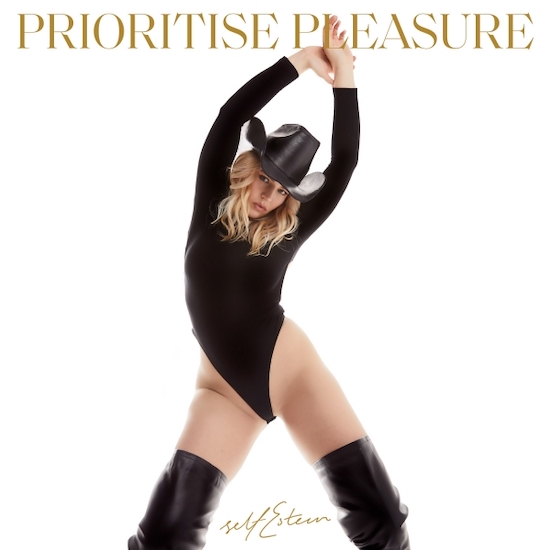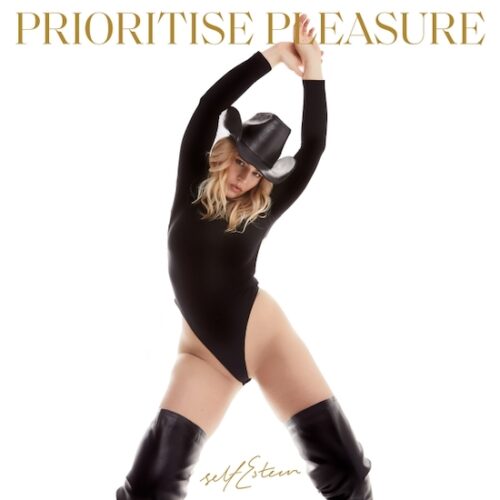Twenty-one. A house party. Someone I’ve never met before. We get drunk. We kiss. It’s late. He tries to go further. I say no. He’s in my room. I say no. I summon all my strength to push him off, out of the door, onto the street. I used to frame this as a funny story, talk about the boy who I threw outside in the middle of the night in his boxer shorts. I rarely think about it these days. Then something will appear on the news or TV, and I know why I have made myself forget it.
Prioritise Pleasure. It’s quite the album title, but don’t shrug it off as a “Live, Love, Laugh” for millennials. Rebecca Lucy Taylor, aka Self Esteem, knows what she’s doing. For nearly five years, she’s performed under a name often stripped of substance in wellbeing culture’s more sanitised highways and byways. She doesn’t care. She fills that phrase up with blood, dirt and grit, uses it as a way to lead people into her world before she confronts them with their more shambolic, truer selves.
Taylor was once the “blonde girl” from indie duo Slow Club between 2006 and 2017, being told “to stand still”, “stop showing off” and “fit in that little dress of yours” by her old managers, phrases she took from real life and added unadorned into her album’s startling first single, ‘I Do This All The Time’. On her new album cover, she’s a cowgirl in a high-legged leotard who clearly, as the album’s title track suggests, “shave[s] my pussy/just for me”. This image is not radical, as she has scrawled in gold pen across vinyl getting ready to be shipped out to fans. Neither is making an album influenced by the gospel pop of Blonde Ambition-era Madonna, the rousing bangers of Katy Perry, or the electronic experiments of Kanye West.
What is radical is this: Taylor uses chaos, rage and despair as tools to prop up her stadium-sized ambitions. She presents these moods not as states to be worked through cathartically to blissful completion, but as the meat and matter of women’s lives – the stuff which never really goes away. And so behind the #empowermentslogans we don’t get neat, empowering narratives – there are songs here that deliberately finish mid-sentence – but lyrics that swing between manic highs, deadening lows and mundane realities, between the inability to exist in the moment, and the constants of self-loathing, lethargy and guilt.
These songs reflect experiences so many women rarely articulate to other people, to each other, even to themselves. There are the bad relationships that friends of mine tolerate, the ghosting they endure on social media and in texts, for no reason other than loneliness or weariness; there is the dread many women have experienced when looking at their own reflection in a mirror, or when they consider their ongoing breathing, the facts of their existence, to be their main problem. I’ve felt like this in situations with men decades ago: it breaks me that while we’re told so much has progressed and advanced, so little has changed. “Might as well carry on/Don’t have to stick to a plan/Just living”, Taylor sings blankly in ‘The 345’. “Even when up against it, I do/Pull you up/Make you shine/To the detriment of my/daily fight,” she adds in ‘Still Reigning’. Its chorus also captures the intensity and numbness that can co-exist for so many women so easily in 2021, given they’re constantly watching and guarding who they are: “I feel everything/and nothing at all.”
Twenty-three. He’ll let me come round, sleep with him, spend the night, but he won’t let me kiss him. He’ll drop out of touch for days, but when he finally texts, I’ll be understanding, pliant, pliable. I’ll be back there again to try and help. I’ll be the one making apologies.
But Taylor is also creating epic pop from this mess, and the soundworld she has built with her producer, Johan Kalberg, is her lyrical support system. On her 2019 solo debut, Compliments Please, her pop was tentatively ambitious and accessible and happy, but still happy to play with unsettling textures and vocals. The uneasy stuff is louder this time around – beefier, darker – but Taylor has twisted it to become a solid component of her strength. She pitch-shifts her voice into a low, monstrous growl to create a woman’s damaged conscience (“They’ll tell you I’m wrong/They’ll tell you,” it snarls). On ‘How Can I Help You?’, Taylor reclaims the abuse she’s received for men and recasts it like a battle cry. “I don’t know shit! I don’t know shit!” becomes a defiant, sarcastic mantra, and she drums along to its rhythms ferociously. It’s like she’s preparing for war.
And then there’s ‘I’m Fine’, its title a phrase so often used when people are anything but. It begins with grumbling, skittering sub-bass, and an industrial sound that attacks like an alarm; it ends with a woman describing on a voice memo how she and her friends “bark like dogs” when approached by groups of men, her words glitching and distorting across the speakers. “People always laugh at it, it’s so funny,” she adds flippantly, a line which for me feels tinged with sadness, “but there is nothing that terrifies a man more than a woman who appears completely deranged.”
Then a woman barks twice at the end of the following bars before she joyfully howls. The effect is both devastating and euphoric; it even feels primed for a singalong live. Self Esteem is doing something incredibly clever: twisting the grammar of female horror into something lively and playful, to bring women together.
Twenty-seven. I am walking home, mid-afternoon, in my charity shop winter’s coat, when a man stops me on the street. He starts chatting me up as I try to get away from him, then a car pulls up from a side-road and its driver gets out. He moves round to open the back door, runs back to his seat, and the other man is suddenly behind me, his hands on my back. trying to push me inside. I shout that I’m pregnant – I’m not, I still don’t know where that came from, I felt the lie rise from the pit of my stomach like it had always been waiting – and I shove and I elbow and I run and I run. I get home, call the police, wait for them to come, take my statement, as I cry on the stairs.
I’ve told very few of my friends about this. I’ve never even told my mother about this. The police don’t take fingerprints. They leave. I never hear from them again.
I first heard songs from Prioritise Pleasure a few months after the vigil in Clapham Common after Sarah Everard’s murder. Something in them captured the exhaustion of women today, always trying to fit in, at the same time as they knew they need to be “very careful out there”. They nailed the exhaustion of women constantly sending long texts to explain themselves (“Stop it – don”t,” Taylor tells us today), our desperation to be loved so we won’t miss out on opportunities and jobs that often go to mediocre men, and our desire to keep a “steady stand” for “as long as [we] think [we] can”. For me, the songs also brought up long-buried memories. It gave them a tune.
Taylor uses stadium-sized melodies as punctuation in her songs’ toughest moments. I wonder if she sees pop riffs as links to prompt her listeners to bond and grow together in power. I sense this in the epic chorus of ‘Fucking Wizardry’, where the gospel harmonies of her backing singers support her as she lets out her agonies (“My hunger times my impatience/Makes me feel reckless/So I let ya/Let you be selfish/ And careless with my head”). I sense this in the incredibly tender tune of ‘John Elton’, a ballad on a similar trip to Adele’s ‘Someone Like You’, where an ex-boyfriend finds someone else and settles down, before his old girlfriend tries to shrug it off, but privately hurts. Taylor instantly makes this pretty song gut-punching by adding in references to insomnia and social media reminders of their distance from each other (“your profile picture is the lad/That your girlfriend gave birth to”). The effect is startlingly visceral, making you want to hold onto your friends.
And then there’s the orchestral middle-eight before the final coda of ‘I Do This All The Time’. It comes after a lyric full of anger and defeat which holds shades of Morrissey at his most lovelorn (“You’re beautiful and I want the best for you but I also hope you fail without me/It was really rather miserable trying to love you”). Then the strings lift us up, and we’re transported to a plane where an acceptance of who we are is the closest we get to redemption.
Songs like ‘Moody’, ‘It’s Been A While’ and ‘You Forever’ also reveal a woman telling other women that we can revel in our flawed, fleshy humanity. They have big tunes but frayed edges, as do so many of our lives. These songs tell us not to stand still anymore. They tell us to start showing off. They tell us to sing again, for ourselves, for each other, all together, gnarly, messy, loud and free.
Prioritise Pleasure is out on Friday



